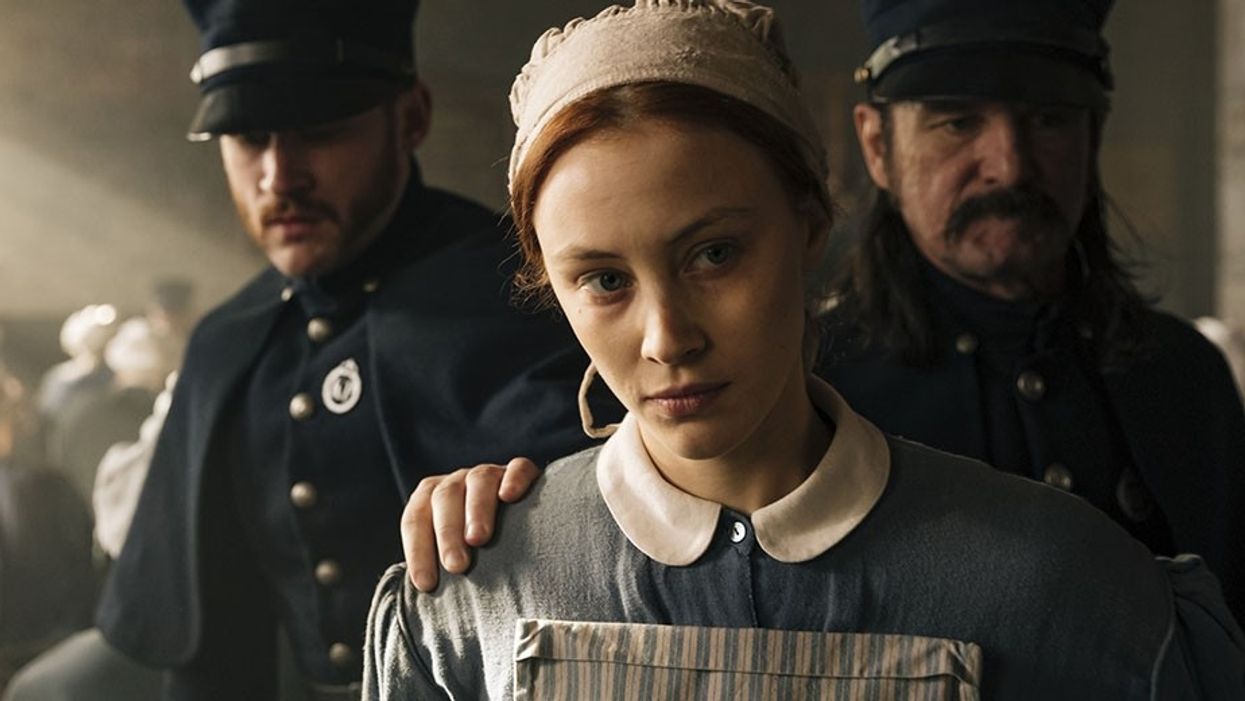'These Girls Were Disposable': 3 Lessons from 'Alias Grace' Director Mary Harron's TIFF Master Class
The maverick director of American Psycho delves into why her provocative stories work so well.

Canadian director Mary Harron has brought her distinctive, indie sensibilities to five feature films. With the premiere of the first two episodes of Alias Grace, Harron's new miniseries for CBC and Netflix, adapted from the novel by Margaret Atwood (The Handmaid's Tale), the director sat down at TIFF on Wednesday for a master class, in which she discussed everything from punk rock to feminism and her approach to casting and directing.
Here are three highlights from the hour-long conversation with this fiercely intelligent, maverick filmmaker.
1. A great performance is "entirely casting"
Harron is known for getting great performances from her actors, starting with her first feature, 1996's indie I Shot Andy Warhol, starring Lili Taylor as real-life would be assassin Valerie Solanas, and, perhaps most famously, Christian's Bale's turn as the blank slate yuppie murderer Patrick Bateman in her at the time super controversial, though now classic, bravura adaptation of the 'unfilmable' novel American Psycho. Asked how she routinely elicited standout performances from her actors, Harron responded that it was "entirely casting" that determined the end result. She elaborated: "If you cast the right person, they will give a great performance, and if you cast the wrong person, they won't....you can cast a really good actor, and miscast them."
Harron says she likes to spend a considerable amount of time with her actors discussing the character, and for Psycho, which she adapted from the Bret Easton Ellis novel that had caused so much controversy on its release it was dropped by its publisher because of the protest, she and Bale discussed the qualities of Bateman, who is, in Harron's words, "a monster." She said her advice to Bale was to think of the character "like a martian," someone who is obsessed with how to behave, to impersonate a person. Bale famously revealed an interesting inspiration for the character, and doggedly worked at the character, bringing a humor to the role that Harron said was lacking from some of the others who auditioned.
"If you cast the right person, they will give a great performance, and if you cast the wrong person, they won't."
2. "Pace it up" and "set the tone"
Harron said that her most frequent direction, by far, to actors, was to "pace it up" (go faster), saying that it could be "hard for actors to judge" their pacing, and that this was doubly true when the actor had an accent or dialect to do. "When they do [an accent], they slow down because they have to think about what they're doing." This sort of directing philosophy extended to the rest of the departments on the film. "Everyone on a film set wants to do their very best," she said. So what's wrong with what sounds like an embarrassment of riches? According to Harron, "We're all [on set] to get something good. If you're the director, you're just the leader of the orchestra," and that her job, more than anything, was to she set the tone. Her second most frequent direction to actors (and other departments, as well?): "Tone it down."
Because of the nature of the medium, she said that it was important to never "fall in love with anything," giving the example of "big, theatrical" moments that really impress the cast and crew but that, when seen in post-production and on a screen, seem far too big for the film they're in.

3. Research grounds fiction in reality
Harron's latest project, Alias Grace (adapted by actress Sarah Polley), is a six-episode miniseries based on Margaret Atwood's 1996 novel about a notorious murder case in 19th century Canada for which two servants in an upper-middle class family were tried and convicted. Although Atwood fictionalized a narrative for her book, Harron researched the prison system in 19th century Canada to ground the series. "The thing I love about real-life stories is...it's just like, 'what? that makes no sense!' Who would think it?" said Harron. Her shock at the brutality of the conditions of everyday life in 19th century Canada, as well as the treatment of lower-class women like Grace Marks, the convicted murderer who gives her name to the book and series, compelled Harron to tell this story.
"These girls were disposable, and I think that's what a lot of Alias Grace is about."
Though she is an admitted and proud feminist, Harron does not to think of herself as an ideological filmmaker, one whose job it is to advance agendas in a didactic manner, but to explore the truth of situations in all their ambiguity. In her latest work, the ambiguity of Grace's guilt or innocence is the hinge of the story. Her feminism was engaged, though, by the research she did into the extreme conditions of life in 19th-century Canada, particularly for women, living in a Victorian society where most of their lives were regulated, and where moral hypocrisy led to the homelessness and deaths of countless young, lower-class women who were impregnated by their employers in shocking numbers. "These girls were disposable," Harron said, "and I think that's what a lot of Alias Grace is about."

In this master class, Mary Harron revealed herself to be a director of sharp wit and intelligence, able to discuss her work with insight, humor and modesty. While loath to heap any accolades on herself, she was quick to give them to others. But there's no mistaking the fierce directorial eye behind every one of her projects, and Alias Grace, which premieres on Netflix on November 3rd, looks to be among her finest work yet.
You can watch the whole hour-long class here.
See all of our coverage of TIFF 2017.
Featured image: 'Alias Grace'. Courtesy TIFF.
Source: TIFF 2017











